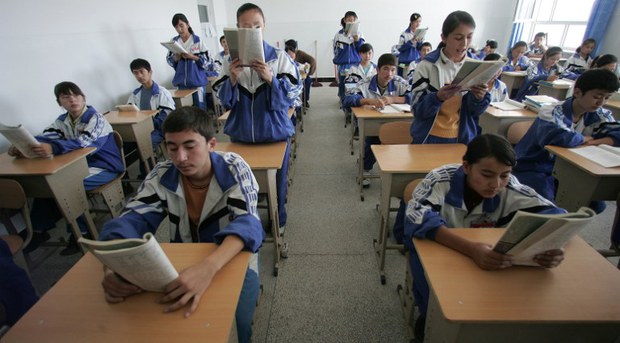Missing Uyghur Poet and Teacher Confirmed Detained After Nearly Four Years

Radio Free Asia, 07 January 2020

Below is an article published by Radio Free Asia. Photo AFP.
A well-known Uyghur poet and literature teacher who went missing in northwest China’s Xinjiang Uyghur Autonomous Region (XUAR) nearly four years ago has been confirmed detained, according to an employee at his local education bureau.
Qasim Sidiq of Ghulja (in Chinese, Yining)—the seat of Ili Kazakh (Yili Hasake) Autonomous Prefecture and the XUAR’s third largest city—was detained by authorities in March 2017, after which he disappeared, a source with knowledge of the situation recently told RFA’s Uyghur Service.
The prolific author and amateur physicist, who previously worked for the Ghulja Bureau of Education and taught at the city’s Dadamtu Intermediate School, disappeared around the same time that authorities launched a campaign of mass extralegal incarceration in the XUAR that has since seen up to 1.8 million Uyghurs and other Muslim minorities held in a vast network of internment camps in the region.
According to the source, who spoke on condition of anonymity citing fear of reprisal, Sidiq had been interrogated by police “on a number of previous occasions” and was likely detained as part of a group of people deemed “suspicious” because of previous brushes with the law.
The source said song lyrics and poems composed by Sidiq as many as 15 years ago had been used as “evidence” for charges against him of “inciting ethnic hatred,” adding that they fear the teacher may have been sent to one of the region’s camps.
RFA called various offices in Ghulja seeking to confirm the source’s information.
An employee with the Ghulja city government refused to provide contact information or other details about Sidiq, although she appeared to be familiar with his name.
The administrator of Dadamtu Intermediate demanded to know where RFA’s reporter was calling from before saying that the school “has no such teacher.” When asked whether there is a Qasim Sidiq among the retired and former employees of the school, the administrator did not provide an answer.
RFA also contacted the Ghulja Bureau of Education, where an employee said he was “unable to look into” Sidiq’s file and claimed not to know of him.
But a second employee at the bureau told RFA that Sidiq remains in some form of detention.
“We can’t talk about cases of people under detention,” he said, when asked where Sidiq is.
When pressed further about when the former teacher, including when he was taken into custody, the employee replied, “There’s no way I can tell you about this.”
“I also can’t talk about how many teachers [have been taken into custody],” he added, before referring further questions to the local Public Security Bureau.
It was not immediately clear whether Sidiq has been in detention since his arrest in March 2017. RFA was unable to locate any sign he went through a judicial process that would land him in prison instead of an extralegal internment camp.
Intellectuals targeted
Sidiq’s detention fits a larger pattern of authorities in the XUAR targeting Uyghur intellectuals and other prominent members of the ethnic group as part of what observers have called a form of “cultural genocide.”
Since the start of the internment drive in 2017, RFA has reported on dozens of leading figures in Uyghur society who have gone missing and whose names have disappeared from the scholarly events, websites, and literature where their work had previously been a fixture.
Poet and former editor Rahile Kamal, who currently lives in Sweden, spoke with RFA about Sidiq, whom she said had begun organizing independent activities and events late in his career, as well as penning lyrics for popular songs, including “Bu Kéche,” which got him into trouble with local authorities.
“I see Qasim Sidiq as an author, poet, and specialist in the natural sciences who is known not only in the Ili region, but also to everyone throughout our homeland,” she said, noting that she had met and spoke with the teacher on multiple occasions.
“Later [in his career], I believe he founded an organization. He worked as the director of a literary and arts group.”
According to information available in online archives, in recent years Sidiq had also made a name for himself in the field of physics, where he published papers and other works that put forth novel concepts and theories.
“He wrote papers about physics, about things most people didn’t really understand,” Kamal said. “Scholars read his papers; they created a lot of buzz.”
Kamal said that while Sidiq composed relatively few poems, he “wrote them very well.”
“Many of his poems had romantic themes and were love poems. The people loved them, and they were circulated widely,” she said.

